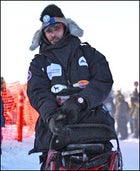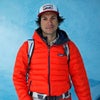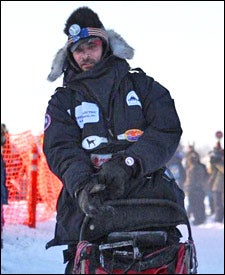ALASKA IS HUGE right now. OK, it's always been huge. But dogsledder Lance Mackey is basking in the brighter-than-usual midnight sun that's been shining on the stack-haired veep candidate, the corrupt old senator, some imperiled caribou, and a fistful of blue-collar reality shows. In March, when the most dominant dogsledder in history lines up at the start of the Iditarod, the rest of the country would do well to pay attention. Mackey, 38, could further his claim to the title of greatest musher ever if he wins both the Yukon Quest (starting February 14) and the Iditarod (March 7)it would mark the third year in a row he's pulled off the back-to-back feat.
Lance Mackey
 Lance Mackey
Lance Mackey��
“That's the plan, anyway,” says Mackey in his understated rasp. (He was treated for throat cancer in 2001.) Raised in Wasilla and now living in Fairbanks, Mackey enjoyed his breakout moment in 2007. That year saw his sixth attempt at the Iditarod; both his father, Dick, and his older brother Rick had won the 1,049-mile sled-dog race from Anchorage to Nome on their sixth attemptsboth while wearing number 13. The night before the race, Mackey camped out to ensure he'd get first pick on his family's lucky number. “I won on my sixth attempt, wearing bib 13,” he says.
More amazing, only a few weeks earlier he'd won the 1,000-mile Yukon Quest, which runs from Whitehorse to Fairbanks, in Canada's Yukon Territory. Last year, Mackey and his dogs repeated their historic double. The Discovery Channel took notice and aired a documentary centered on Mackey called Iditarod: Toughest Race on Earth, which aired in October, and Conan brought him on Late Night around the same time. By last fall, Mackey was easily the second-most-recognizable figure to come out of Wasilla.
Other mushers, like the late Susan Butcher and Doug Swingley, have won the Iditarod three consecutive years, and Rick Swenson holds five titles spanning three decades, but nobody else has competed in both nine-to-14-day sufferfests in the same year, let alone won them. When talking about his success, Mackey is quick to downplay his own toughness and credit his dogshigh-octane mixes of huskies, Labradors, and German shorthaired pointers, among otherswho pull him for up to 16 hours a day in temperatures that can hit minus 70, often in whiteout conditions.
“I'm not going to say I've got the best dogs,” says Mackey, “but they're mentally sound. One thing my kennel doesn't have problems with is mental toughness.” Nor, apparently, does the musher. “The more races I do,” he says, “the more I learn how to beat my competitors.”


